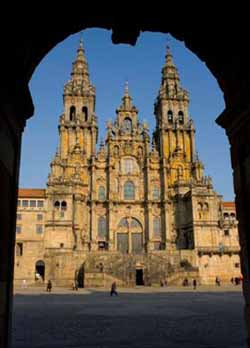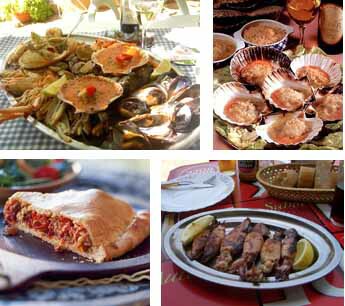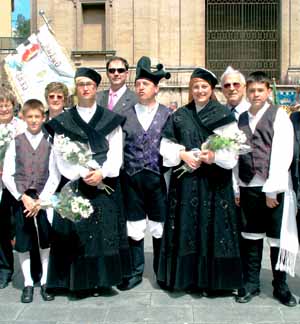The Organic Formation of a Region
Plinio Corrêa de Oliveira
In Europe, the countries we know are divided into regions that not only are different geographic parcels, but almost constitute small countries inside the larger one. They are units that together make up the national unity. One might compare them to petals of the same flower: Each petal is a unit in itself with its own characteristics and way of life. The national unity of a country is thus formed by the contributions of its different regions.
St. James Cathedral, Compostela Those regions formed organically. They were not planned by bureaucrats sitting around a table and deciding their boundaries on paper. There was no commission in Spain, for example, that long ago determined: “Let us divide the regions by the rivers to facilitate trade and travel. Thus, we will call the area around the Guadalquivir Andalusia; the land served by the Ebro will be Aragon, and Castilla and Leon will benefit from the Duero.” No, this is not how the regions were formed – they developed organically.
Events and circumstances of life mixed spontaneously to form these regions. The history of Galicia, for instance, completely changed after the discovery of the grave of St. James the Greater. Pilgrims began to flock to Santiago de Compostela, which became one of the most famous pilgrimage sites in History.
From this enormous influx of pilgrims came new roads, inns, churches, monasteries and chapels that were established to assist them materially and spiritually.
It also became a source for the exchange of information. Two pilgrims, one coming from Portugal and another from Poland, would meet at an inn and exchange news about their countries and customs. In the Middle Ages there were no newspapers or radios, so the pilgrimages provided a means to know what other peoples were thinking and doing. A man in Portugal normally would not know very much about anything in Poland. But after the two pilgrims had met and conversed, the Portuguese traveler would have some notion of the other country and be able to say, “Yes, I learned that from Stanislaus, a pilgrim I met in Compostela…”
Hence the site of the Apostle’s grave developed and became a center of cultural and religious influence as well as commercial and economic activity. It also grew to be a place of wholesome entertainment with troubadours and performers coming from various regions and countries to divert the travelers. This intense movement caused the site to become a city, which assumed the name of the Apostle – Santiago de Compostela – and became the capital of all Galicia.
Galician dishes, clockwise from the top: mariscada, conchas de Santiago, grilled calamares, empanada Gallega Obviously the geography of the region did not change because of the pilgrims. Its multiple rivers, craggy mountains and long coast with its many dangerous cliffs – for example, the Costa de la Muerte, Coast of Death – made Galicia a region where seafood was a good part of the cuisine, and fishing provided substantially for the people’s daily sustenance. It naturally generated commerce as fishermen offered their wares to the public. It also gave birth to a gastronomy that specialized in seafood, and some of their special dishes, such as the mariscada and the empanadas Gallegas, acquired a fame that crossed the borders of Galicia and Spain, and even crossed the Ocean and reached us here in Brazil. Nor should we forget their most famous conchas de Santiago or coquilles Saint Jacques, shells of St. James that one can order in any French restaurant around the world.
The psychology of the people, with their original Celtic blood and independent spirit that came from their history, was also conditioned by those geographical, religious, cultural and commercial elements. So, the Galician came to be known as an adventurous, suspicious and stubborn man deeply rooted in the customs and values of his region, and as a naturally Catholic man.
This is an example of how a region forms organically. The boundaries of an area are drawn by causes and effects that intermingle and produce something rich and new. So, that most interesting region called Galicia came to be something that no one could have imagined beforehand.
Typical dresses of Galicia This kind of organic development is the opposite of the procedure used by Napoleon, who artificially divided France and other parts of his Empire. He divided everything arbitrarily, with the general aim of breaking the organic characteristics of Christendom and promoting the Revolution.
The correct way to govern is to permit regions to develop naturally according to the fundamental principle of an organic society: everything licit should be allowed the greatest possible freedom. What is good should be given the liberty to develop. Then, when one good thing mixes with another, a third is usually generated. Let the pilgrims come and go freely; let a road be build for their needs; propitiate conditions for inns to be established along the way; help the chapels to be built: This is to govern organically. It is not to oblige people to do what was planned artificially by a group of technicians.
Another important principle not to forget is that we should be intolerant with evil and repress its first symptoms. But we should allow what is good to progress freely as much as possible. In today’s society, most of the time we must take a position where we say “no.” This is because it is a revolutionary society that tends to destroy all the remnants of Christendom. Because of this habitual position we take, our enemies accuse us of being negative and opposed to liberty. The accusation is not true. We are enemies of all those who are against the glory of God, the Magisterium of the Church and the revealed truths. To these people, we say, “No, you cannot do such things, and we will combat you.”
On the other hand, our position toward good actions, toward those things that follow natural law, is to encourage them to develop freely, for they normally give good results. To try to coerce them according to a previous plan is a mistake.
The Organic Formation of a Region by Plinio Correa de Oliveira


 LinkBack URL
LinkBack URL About LinkBacks
About LinkBacks





 Citar
Citar

Marcadores